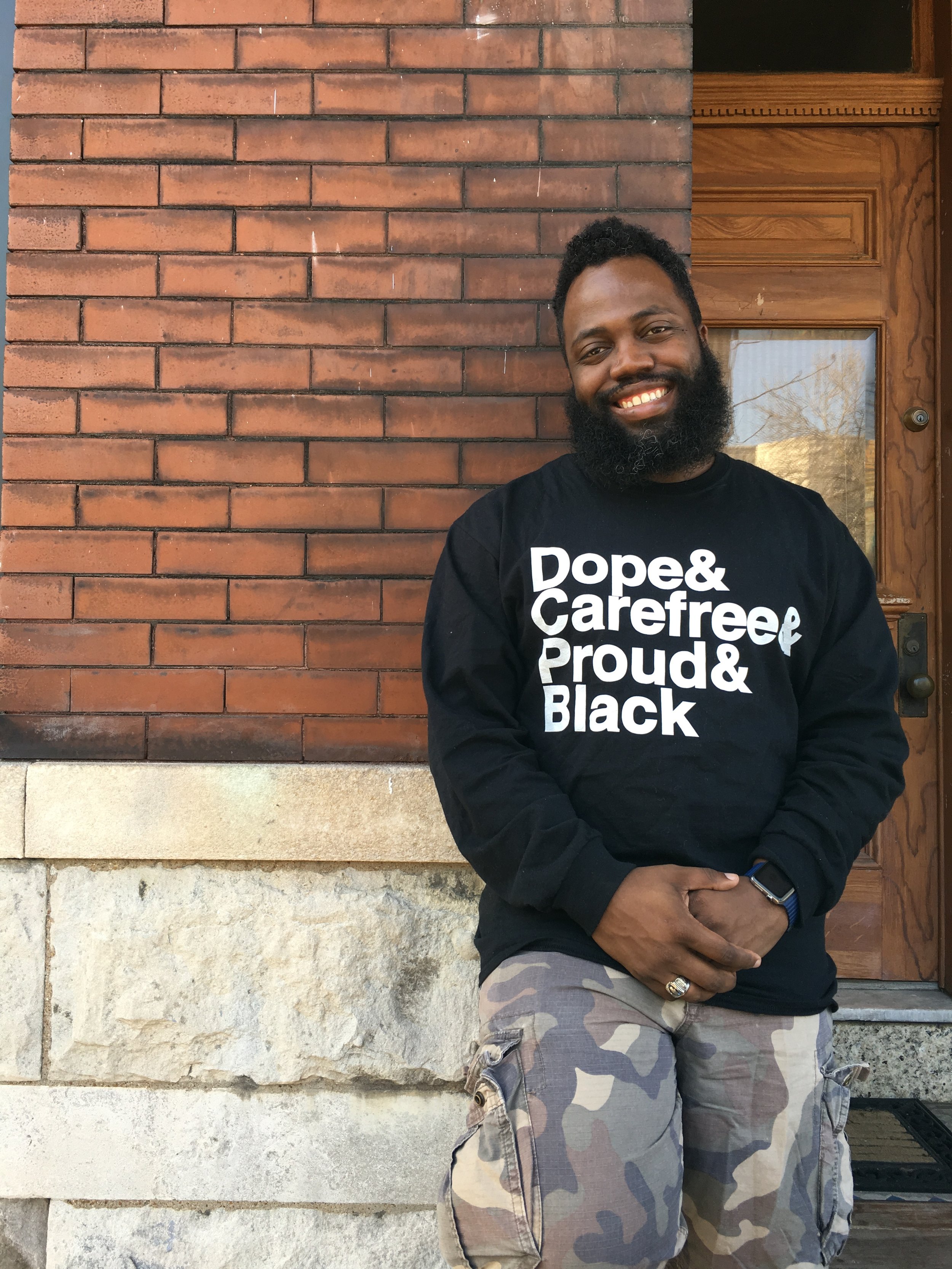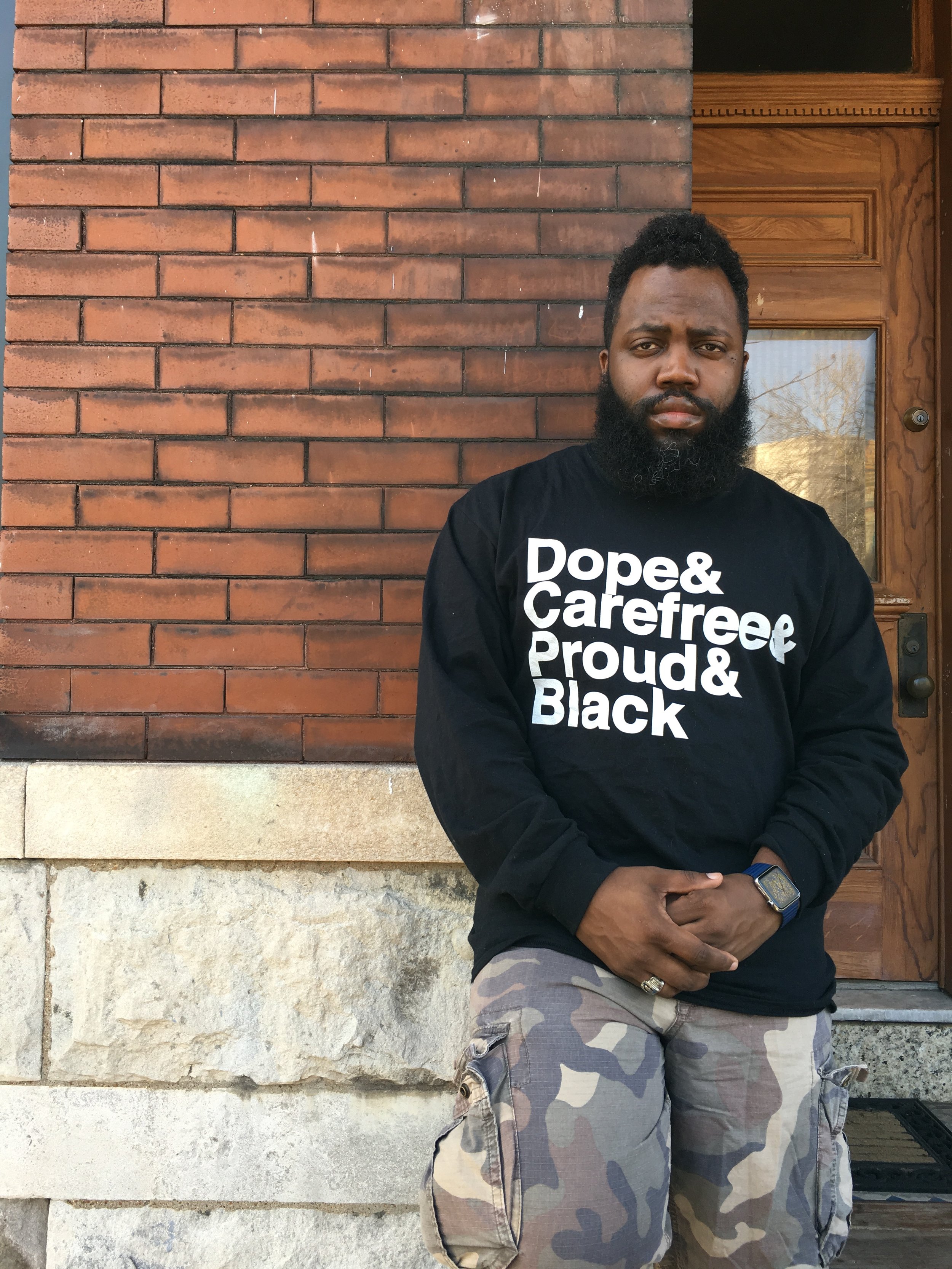Today on the blog, I talk to Reggie Noble. "Kid Noble," as he is known on twitter, is the man behind “Pure Black,” a t-shirt brand whose slogans and sentiments are embraced by activists around the country. His original design – “Pure Black Nutritional Facts” – was the result of a social media crowdsourcing process (#PureBlack). Noble has a background as a designer and communications professional, and he was a part of the protest community in Ferguson, Missouri. We talked about activism and finding creative ways to communicate about injustices. As a bonus, we talked about the perils of miscommunication on twitter.
Me: Tell me the story of how you started Pure Black.
Noble: I wanted to come up with something cool in the wake of what happened in Ferguson, Baltimore, South Carolina, all these different places. Something to celebrate Blackness that’s affirming to Black people. I wanted to communicate that we are here, okay, and great. I wanted to celebrate that.
I designed the first shirt in June last year, and I asked twitter for ideas. Nobody knew I was designing a shirt, though. I just asked people to share what they love about being Black. I used to do this thing called “Noble Quest” on twitter, where I would ask a bunch of questions, so I framed it as that.
Noble, wearing the original Pure Black Nutritional Facts design.
Some of the responses were great, some were cheesy. But I used a lot of them. I made a mock-up of the original shirt and texted it to like ten friends of mine. What are your thoughts? What would you change? What do you like about it? Most people thought it was dope, but a few people wanted to play with the percentages. The big controversy was over whether respectability should be 0%. People were like, “Why wouldn’t I want to be respected?”
I’m like, “That’s not what that means.”
I put the shirt out in August 2015, near the anniversary of Mike Brown’s death. The goal was to sell fifteen shirts. I hit that in the first hour. I was blown away. I was like, let it ride. The original was the Black shirt in white lettering (above). People eventually wanted colors and sweatshirts and hoodies. It just kind of took off from there.
Me: Crowdsourcing the shirt was a very “right now” sort of thing to do, in terms of design thinking and empathy-driven prototyping. Is that why you did it?
Noble: I wanted community input, because I wanted the shirt to be something lots of people found attractive and could see themselves in. I could put together the coolest thing in the world to me, but if nobody else thinks it’s cool, they won’t buy it. I compare this with the new Smithsonian museum [for African-American History & Culture]. People can see themselves in that museum, because there’s everything from the history, and it's familiar. There are pictures of my friends Netta and DeRay in there.
Someone might buy the shirt because they suggested a word. I’m always about community input as it relates to most things, including the workplace. I just quit my job at Apple because I moved, but they are big about feedback, and they talk a lot about positive-specific and negative-specific feedback.
Me: You mentioned some of your friends that are prominent in the movement for Black lives. You also came out of the protest movement in Ferguson. Talk about the intersection of movement work and commerce.
Noble: In some ways there’s this conflict between what I try to capitalize on, and when do I just let it ride. For example, when Jesse Williams made his speech at the BET award show, about blackness being real versus magic, I was like “Oh, I can jump on that,” because it’s not at the expense of anyone.
But I never wanted to do any shirts with someone’s name, which felt to me like profiting off of Black bodies. It’s a conflict sometimes. The other way I rationalize it is, I try to put out the shirts at a time when nobody just died. I also try not to advertise in the immediacy of someone dying. Most of the advertising is word of mouth anyway. Someone posts a picture, then someone reposts it.
Me: How did you get involved in the Ferguson protests?
Noble: Before any of the publicized killings happened, I was at my mom’s house one day. My brother was there, and in the middle of the night he took my car to go to the gas station. The temporary tags on my car had expired, and I didn’t have real tags yet. He got pulled over at like one or two in the morning. He’s nervous, because he took my car without asking me, and it’s the fist time he ever got pulled over. He doesn’t handle pressure well, so he was nervous. He kind of freaked out. The police see he’s nervous, and suddenly there’s more than one cop car, and there’s more than one cop. So they asked to search the vehicle, and he agrees. They ransacked the car, as police do. They basically told him to get his tags straight, and they let him go. He didn’t tell me when he got home, because he was afraid to tell me he took the car.
The next morning I went to leave for work. I get to my car, and I call mom and I say that it looks like someone broke in the car. That’s when she finally told me that my brother got pulled over. I was terrified for him, because those police could have done anything to him.
A few months later Mike Brown gets killed. But what had an even bigger impact on me is when Vonderrit Myers was killed by a police officer, which happened in my neighborhood. The same cop that stopped my brother could have been the one who shot him. My brother wanted to go to the protests after Vonderrit, but I wouldn’t let him, because I wanted to protect him.
I had been out in protest after Mike Brown's death, but the next night after Vonderrit I went out, and that was the night we shut down one of the main streets in South City. The next night was the one we shut down QuikTrip. That’s when I met Brittany, and DeRay, and Kayla. I had known Netta since 2009, but that’s when I met everyone else.
Me: What’s it like in St Louis and Ferguson now? What does activism look like when the cameras leave?
Noble: A lot of what’s going on now is around trying to make policy changes. As it relates to actual protest, because we protested for so long, the police have adjusted what they do, so we’ve adjusted what we do. It doesn’t blow up anymore. Some cities are learning that now, but we learned that in 2014. What’s happening now is the police conversation at the policy level, and the implementation of the consent decree. That’s where the activism is moving. A lot of manpower was put into the local elections, getting someone who’s much better than Jennifer Joyce as the circuit attorney, for example. We want to put different people in political positions.
Me: Okay, before we wrap up, we should talk about how we met, and I should disclose that I'm a proud owner of one of your shirts; I'm literally wearing it on my "About" page. I got that shirt after you and I had a funny interaction on twitter. You were advertising, I reached out to you like this, and here’s how you responded:
Noble: Yeah, you were like two seconds away from getting blocked. You seemed like you were serious, but I’ve had a lot of white people like, “Well, what if I wore a ‘Pure White’ t-shirt, wouldn’t that be racist?” But I texted Brittany, and she was like, “Oh, he’s cool,” so I answered you for real.
Me: I think I was actually with her when you guys texted about me, which was weird. I feel like I have a lot of fraught interactions on twitter, especially as a White guy who’s involved in issues of race and police violence. I want to be sincere and open, but I bring a lot of baggage, just by being a White dude. Sometimes, when White people ask you about the shirts on social media, you just send me to explain it to them, which feels like an extension of my broader job of talking to other White people about race.
Noble: Yeah, but you’re so good at it!
Me: Well, I know white people.
Noble: But that's the thing, whether we like it or not, sometimes White people hear things better when it comes from other White people. If that's what it takes, do it.



